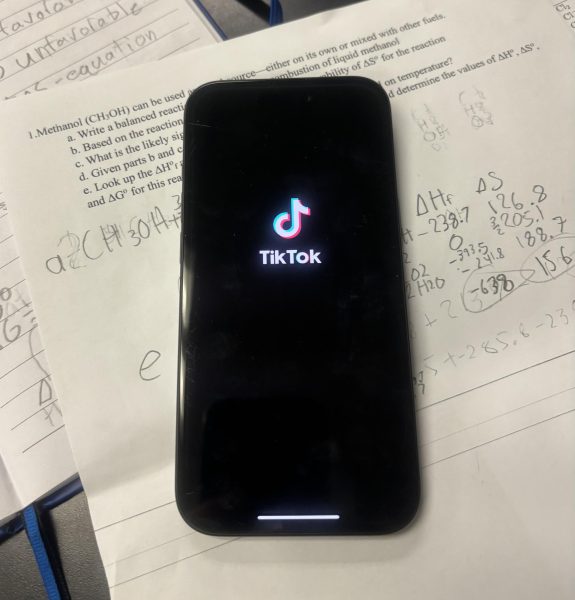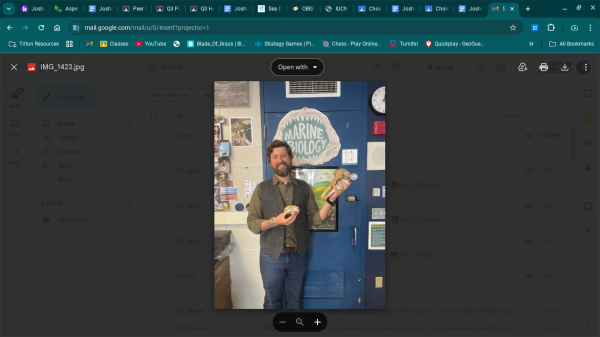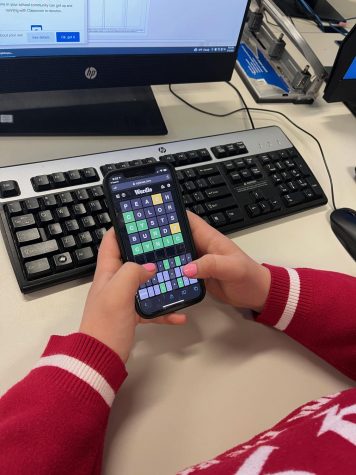Sounds of Distraction
Does listening to music really help focus?
Junior Anthony Mariniello listens to music while doing work in Algebra 2.
Glancing up from his phone, junior Anthony Mariniello quietly taps out a beat to the music playing out of his earbuds.
“Listening to music helps me focus,” said Mariniello. “I listen [to music] in every class.”
In the 21st century, it is not uncommon to find teenagers walking around with some form of earbud in their ear. Teenagers may not see any issue with listening to music while talking to others, but adults can feel differently. As Apple Airpods and other wireless earbuds are on the rise, it is becoming easier for students to hide their earbuds under their hair. Even if teachers enforce a “no phone” policy, some students can still listen to music without their phones connected to them. This may be because of a generational trend.
According to the study Brain areas involved in spatial-temporal reasoning by The Department of Physics at the University of California, Irvine, music can be beneficial to students on certain levels. For example, classical music is known to empower the brain and help with memorization. This is commonly known as “The Mozart Effect”. However, any music with lyrics can prove to be distracting. Students might be more distracted if they are thinking about the lyrics of a song, instead of the work they are trying to focus on.
Still, music can have it’s benefits as well. While silence does have its benefits, it is rare to find a dead silent classroom in a high school, unless it is for an exam. Studies conducted by expert Gordon Shaw proved that listening to music provided better work completion versus work completed with people talking in the background.
“In a classroom where there is other stuff going on, … the music can drown everything out, so I think that is could help people focus” said Ms. Stacey Beaulieu, an Instructional Assistant at Triton.
Students agree with Beaulieau. Both junior Claudia Umanita and Mariniello noted that music helps them to stay focused. “If I am doing regular paperwork, then yeah, I will listen to music… If I want to focus, I listen to music that I know really well so I don’t have to think about it,” said Umanita.
While music may prove to benefit the focus of students, adults have different views. “Students have much more access to technology today,” said Assistant Principal Kathryn Dawe.
Beaulieau agreed, “I used a Discman and a Walkman when I was in high school,” she recalled.
With loads of access to free music, is there a line that is crossed with disrespect? Some students walk around the school and classrooms with their earbuds tucked under their shirts all day, easily popping in and out of their headphones. It is not uncommon to see students conversing with one earbud in.
“I know that if I have my music and they have their music, we are giving equal amount of attention to the conversation,” said Mariniello.
However, when addressing the older generation, adults find it inconsiderate to listen to music during a conversation. “I have to remind students to take out their earbuds when I’m talking to them,” said Dawe.
Dawe notes she is happy when she approaches a student, and they take out their headphones to listen to her. “It shows that level of respect in a student … teachers notice that kind of thing,” she said.
However, it can get frustrating when students continue to listen to music while having a conversation with them. “I trust that my [lacrosse] girls aren’t listening to anything when I am talking to them before a game, but I still tell them ‘headphones out’, just to make sure I have their complete attention” said Beaulieu, who is the high school varsity lacrosse coach.
While both adults and students have their differences, it is evident that this is a trend that will continue.
“I love my music” said Mariniello. “I couldn’t do anything without it.”

Hi! My name is Alexandra Flodman and I am a junior at Triton High School. In school, I love swimming on the Swim Team, as well as participating in VTV....









